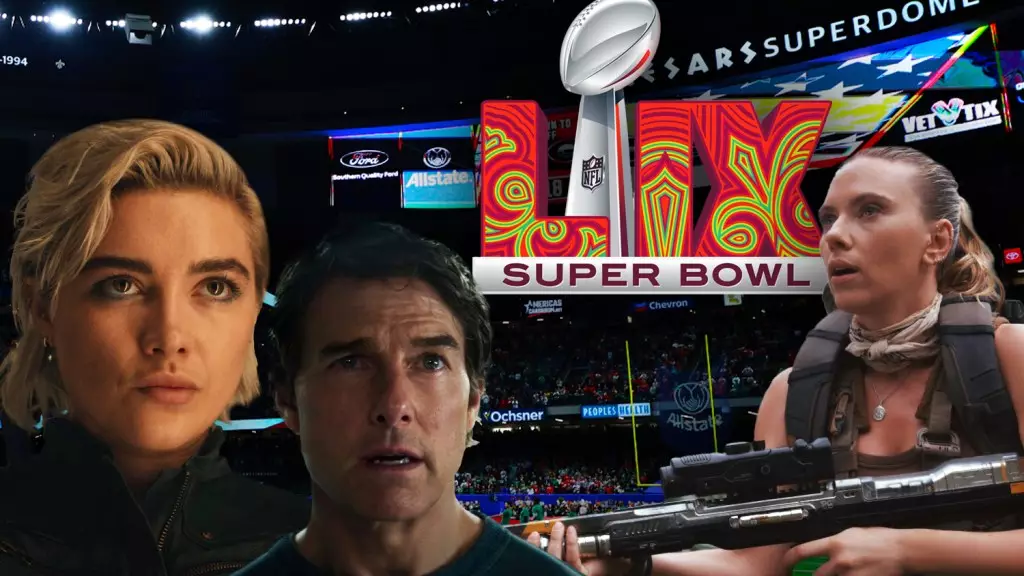There are few events in the American cultural calendar that command the kind of attention bestowed upon the Super Bowl. Beyond the unparalleled athleticism and sheer entertainment of the game itself, the event serves as a lucrative stage for movie studios to showcase their upcoming blockbusters. Despite a general decline in conventional cable viewership, the Super Bowl remains an island of opportunity for filmmakers. The reality is stark: if you want to reach an audience that’s still somewhat unified around traditional media, the Super Bowl is a prime venue for your cinematic messages.
As of now, only a handful of studios—Disney, Paramount, and Universal—seem to be committed to diving into the high-stakes pool, each dishing out between $7.5 million and $8 million for a brief, yet impactful, 30-second commercial. Last year witnessed an astounding total viewership of approximately 123.7 million across linear and streaming platforms, ensuring that every second counts immensely. This unique platform has given rise to blockbuster promotional strategies, where studios aim to create memorable ads that not only announce their films but also become conversation starters in their own right.
Disney reigns supreme as the top studio, having raked in over $2.2 billion domestically in 2024 alone. It is no surprise that they are a staple at the Super Bowl, using the event to generate buzz around highly anticipated titles. This year, we might expect to see trailers for “Snow White” and “Lilo & Stitch,” along with fresh footage from Pixar’s “Elio.” Disney has a storied history of utilizing Super Bowl spots as launch pads for major summer films, and with Marvel Studios in their arsenal, their strategy will likely include at least two trailers for titles like “Captain America: Brave New World” and “Thunderbolts.”
Universal Studios, closely trailing behind with a domestic box office total of $1.88 billion, has its own lineup of films poised for promotion. Audiences can expect to see trailers for the live-action “How to Train Your Dragon” as well as “Jurassic World Rebirth,” a film featuring an all-star cast. The buzz around Blumhouse Productions suggests that they may also showcase “M3GAN 2.0,” a sequel to a film that captured audience imagination just last season.
Paramount, not to be overlooked, also has plans for the event. Even without its streaming platform, Paramount+ directly tied to the game, the studio isn’t shying away from capitalizing on this immense viewership. They are expected to reveal trailers for several upcoming films, including a comedy thriller starring Jack Quaid, along with musical delights involving the Smurf franchise. Their history with the Super Bowl positions them well to capture attention, as seen with their past “Mission: Impossible” campaigns.
Interestingly, studios like Sony, Warner Bros., Netflix, Amazon, MGM Studios, and Lionsgate appear to be on the sidelines this year, opting out of a Super Bowl presence. Their absence raises questions about the changing dynamics of movie marketing and whether traditional methods still hold the same weight in an increasingly digital landscape. Notably, the last time Warner Bros. attempted a significant promotional foray during the Super Bowl was with “The Flash” in 2023. Without a new entry from James Gunn’s Superman during this year’s big game, the gap left by these studios becomes even more pronounced.
The current competitive landscape suggests that the traditional tentpole approach may be evolving. With the barrage of content available on streaming platforms, studios may choose to invest in alternative advertising channels that yield more direct engagement with potential audiences.
As Hollywood’s leading studios prepare for the Super Bowl, the stakes couldn’t be higher. The massive viewership provides unparalleled exposure and can catapult a film’s presence in the marketplace. However, with more studios choosing to sit this one out, the question arises: Is the allure of the Super Bowl beginning to fade as studios search for new avenues to engage their audiences? While this year’s lineup promises a display of thrilling trailers, it will undoubtedly spark discussion about the future of movie advertising in an ever-evolving media landscape. Only time will tell if the Super Bowl remains a priceless marketing goldmine or if it becomes yet another relic of a bygone era in cinematic promotion.

